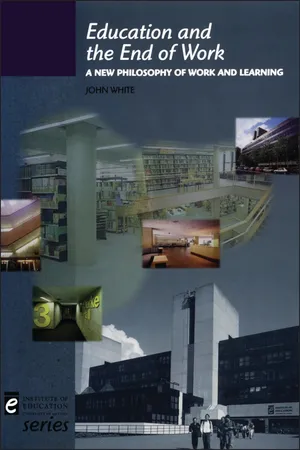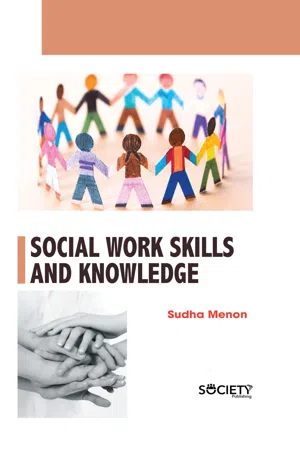Social Sciences
Work and Worklessness
"Work and worklessness" refers to the state of being employed or unemployed. In social sciences, it is a key concept for understanding economic participation and its impact on individuals and society. The study of work and worklessness encompasses factors such as employment rates, job satisfaction, income inequality, and the social and psychological effects of unemployment.
Written by Perlego with AI-assistance
Related key terms
1 of 5
3 Key excerpts on "Work and Worklessness"
- eBook - PDF
- John White(Author)
- 1997(Publication Date)
- Continuum(Publisher)
In fact, we have been here before - a couple of paragraphs ago. The centrality of work is certainly deeply embedded in the culture. But this fact does nothing to shore up the evaluative conclusion that in our society work is a well-being (or self-realisation) need. For all we know, people's well-being in that society may be best served by chal-lenging and undermining work's hegemony. We may, for all we know, do well to reject the view that work determines our identity: perhaps we would flour-ish better if attachment to work were not so indelibly a part of us. Sean Sayers Sean Sayers (1988) defends the central contention in Marxist socialism 'that socially productive labour is, in Marx's words, man's essential activity' (p 722). Like Norman, whose views are also in the Marxist tradition, if less tied to Marx's writings themselves, Sayers believes there is a human need to work. 'Work' he defines as a form of productive activity directed towards useful ends. It is also for the most part a social activity (pp 726-727). He seems ambivalent on whether or not 'work' should be equated with 'a job', with 'paid employ-ment'. On the one hand, he states that there are many kinds of work which do not take the form of a job, not least domestic work traditionally performed by women (p 727). On the other hand, we find statements like 'women feel a need — an inner need — for work: a need for a job as an end in itself ...' (p 728); or 'the socialist principle of the right to work is a demand for jobs' (p 729). Leaving this last discrepancy on one side, we can see that Sayers' definition is narrower than the one I proposed in Chapter 1. He wants to restrict 'work' to activity aimed at useful ends, whereas I treated it only as activity directed towards some kind of end-product, not necessarily a useful one. - eBook - PDF
Management Under Differing Value Systems
Political, Social and Economical Perspectives in a Changing World
- Günter Dlugos, Klaus Weiermair, Wolfgang Dorow(Authors)
- 2019(Publication Date)
- De Gruyter(Publisher)
The authors of Work in America (1973) provide a multi-dimen-sional definition of work: an activity that produces some-thing of value for other people (p.3). The authors claim that this definition is a comprehensive one that puts work within a social context and it suggests that work is purpose-ful. Two main functions that work serves are identified in Work in America. The first and the most dominating thought about work's meaning is its economic purpose(s). Less atten-tion has been given to its second function, which is its so-cial purpose (s) for the individual. An empirical attempt to define work has been reported by Weiss and Kahn (1960). They selected a probability sample of working men — aged 21 and over, living in Detroit — and pre-sented them with the question: In your opinion what makes the difference between something you would call work and some-thing you would not call work (p.143). Over three fourths of the respondents defined work either as activity one performed bu.t did not enjoy or as activity which was scheduled or paid for. Shimmin (1966) presented some of the criteria suggested by various authors who soilght to define work. These are: (1) Work is purposeful activity; (2) It is instrumental; (3) It yields income; (4) It causes expenditure of effort; (5) It has some element of obligation or restraint. Steers and Porter (1975) concentrate mainly on the importance and meaning of work for the individual from a psychological point of view. They see four main functions of work: (1) Exchange — each person receives some form of compensa-tion in exchange for the services that he/she gives. (2) Social function — interaction with other people. (3) Status — work provides status and rank in society for workers. (4) Personal meaning — source of identity, self-esteem, self-actualization and fulfillment. On the other hand, work can also provide frustration, boredom, and a sense of alienation. - eBook - PDF
- Sudha Menon(Author)
- 2019(Publication Date)
- Society Publishing(Publisher)
Therefore, the concept of well-being is what defines the basic role of social work in the community. The concept of well-being is defined as a state in which people in the society do not have problems. In other words, it is impossible to define the concept of well-being without examining social problems. Social problems occur when some aspects of the society are not functioning as they are supposed to be functioning. For example, when the social institution of education fails to function properly, then it can be said that the entire society faces a problem. Similarly, when an individual is unable to cope with the issues of life and becomes suicidal, then it can be said that the individual, as part of the society, is not functioning properly. Social work provides solutions to such, and many other problems, by using specific procedures, approaches, and techniques. Therefore, the purpose, function, and role of social work in the society are defined by sociological principles. The second importance of sociological studies to social work relates to the issue of inequality. Social inequality is one of the main tenets of social work. Social workers are concerned with identifying the effects of inequality in the society and developing the right approaches to tackling the unpleasant effects of inequality on the lives of people in the society. In sociology, inequality is treated as a result of competition for resources. The conflict theory holds that the distribution of power and resources in the society is skewed and unequal (Dominelli, 2009). It is further pointed out that human beings in the society are in constant competition for political, social, and economic resources. Political resources are defined as the privileges and rights that people have regarding the decision-making process.
Index pages curate the most relevant extracts from our library of academic textbooks. They’ve been created using an in-house natural language model (NLM), each adding context and meaning to key research topics.


